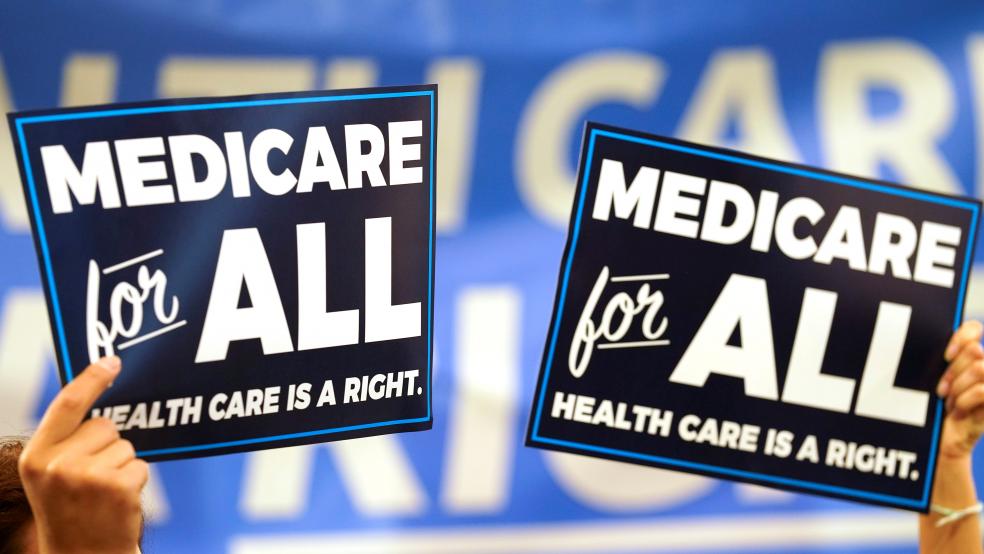Massive cost reduction is a crucial feature of the Medicare-for-All proposals from Democratic candidates Elizabeth Warren and Bernie Sanders, with a big chunk of the trillions in savings coming from the reduction of overhead and labor costs throughout the health care system, much of it related to insurance billing and payment.
That almost certainly means job losses, however, with as many as 2 million people made redundant in a government-run, single-payer system, according to some estimates – and that could be a major political problem for Democrats, says Politico’s Rachana Pradhan.
To be fair, not all Democratic proposals for universal health care would eliminate private insurance, Pradhan points out. “But under the most ambitious schemes, millions of health care workers would be at least displaced if not laid off, as the insurance industry disappears or is restructured.”
The problem would particularly acute in places that have built their economies with a focus on health care. Pittsburgh is one such city, with about 140,000 people now employed in health care, making up roughly 20% of the regional workforce, Pradhan reports. In addition, nearly 10,000 people work directly for health insurers, and thousands more as brokers. How many of those jobs would be eliminated by a single-payer system?
Job losses are part of the package: Economists disagree on how severe the job loss would be, and much depends on the details of the reform plan that manages to become law. Both Warren and Sanders have spoken about retraining workers who lose their jobs, and Sanders in the past has suggested that a lower-price health care system could actually support more workers. But economist Robert Pollin, who has worked with both Warren and Sanders on their plans, says that job elimination is unavoidable. “You can’t have it both ways. You can’t have savings through administrative simplicity and more jobs. The government won’t need these people,” Pollin told Pradhan. “The savings don’t come out of the sky. The main way we save money is through administrative simplicity. That means layoffs. There’s just no way around it.”
The bigger issue: The job loss problem points to a larger question, Pradhan says: How much should the U.S. spend on health care? Of course, there’s no easy or obvious answer to that question, but experts from across the political spectrum generally agree that the U.S. system is too expensive, even as it fails to cover the whole population. But that hard -to-deny fact doesn’t help us answer the question of how to go about changing the system. Single-payer proponents say job losses are simply the price we have to pay in order to build a more efficient system, one that brings overall health care spending closer to the levels seen in other wealthy countries, but that’s a tough sell to those who depend on the system for their livelihood.
A medical billing manager Pradhan spoke to captured the tension between the promise of a simpler, more streamlined and presumably cheaper system and the potential economic loss for caught up in the effort to transform it. A worker whose job lies within the “huge network of payers, processers, and specialists in the complex world of making sure everything in the system gets paid for,” the billing manager said she liked the idea of universal health care, and a single-payer system would make her job much easier – but also might eliminate it entirely. “What if my job doesn’t exist anymore?” she asked.
Critics take aim: Pradhan’s highlighting of the jobs problem provided fresh ammunition to critics who oppose Medicare for All. The Partnership for America's Health Care Future, an alliance of hospital, health insurance, and pharmaceutical lobbyists, sent an email Tuesday citing the analysis to warn that Medicare for All “could threaten jobs and restrict access to care.” Joe Biden, who opposes Medicare for All and proposed to build on the Affordable Care Act with a public option instead, also sent an email referencing the report. “Simply put, we’re not going to beat Donald Trump next year with double talk on health care. And we’re certainly not going to beat him by trying to kill millions of jobs in communities around our country,” a Biden campaign spokesperson said.
The bottom line: The U.S. health care system is both enormously wasteful and a provider of millions of good, middle-class jobs. Reducing costs will be hard to do with eliminating jobs, and that’s a conundrum health-care reformers will have to deal with more explicitly than they have done so far. “This is a genuine political problem that reformers would be unwise to ignore,” Eric Levitz of New York magazine wrote Tuesday. “But it is also a testament to how wasteful the existing system is.”



